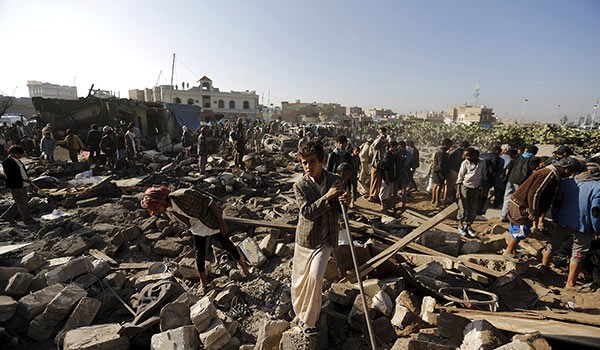
RNA - The wishful House Concurrent Resolution 81 is now effectively dead, following an expected bit of sleight of hand by the House Rules Committee. The resolution demanded an end to US involvement in the Saudi invasion of Yemen, on the grounds that such involvement was never authorized under the War Powers Act. Under the War Powers Act, any Congressman is able to bring such a legal challenge, and is guaranteed a floor vote on the matter.
Amid mounting unauthorized US wars around the world, H.Con.Res. 81 was the biggest attempt to enforce the War Powers Act to limit such conflicts. While the Rules Committee technically only stopped a single challenge this way, and the War Powers Act remains on the books, the success of this sort of chicanery means that the Congressional leadership can do the exact same thing to any future challenges.
Sadly enough, that’s not all. The US has also deepened its role in Yemen’s conflict by more directly aiding its regional allies. The increase in direct US assistance is not restricted to non-lethal measures and blockade, and there is sign everywhere the US is considering waging strikes on resistance group Ansarullah targets.
This is while the conflict has claimed the lives of more than 15,000 people and pushed the impoverished country to the brink of famine. The illegal conflict has included arms sales to Saudi Arabia and refueling of Saudi-led coalition jets. Meaning, Washington carries some of the blame for the civilian fallout.
Worse still, the US is examining offering the United Arab Emirates, intelligence, surveillance and reconnaissance assets and information sharing. This comes amid a broader U.S review into its policy in Yemen, which for years has been seen almost entirely seen through the prism of America’s imaginary fight against Al-Qaeda.
The US government must end the war and arms sales to Saudi Arabia because the Saudi naval blockade of, and air strikes in, Yemen are breaching international law. What’s more, an arms cut-off is supported by most UN member states. They cite a number of Saudi war crimes, including the targeting of civilians and those not directly participating in hostilities’ by Saudi airstrikes. They conclude that, on the basis of the information available, the US government is acting in breach of its international obligations on arms exports.
The law is crystal clear: any Saudi attack, whether deliberate or not, that fails to adequately protect civilians is a violation of international law,’ And UN member states’ obligations are equally clear - as a major supplier of Saudi Arabia’s weaponry, the US and other western governments are legally obliged to suspend arms exports.
US bombs and fighter jets have been central to the destruction of Yemen. As long as Saudi Arabia enjoys the political military support of the US and the most powerful Western nations, then it will continue oppressing its own population and those of neighboring Yemen.
Yemen is on the brink of catastrophe and time is running out to help. The world community can help stop US-made bombs falling on Yemen, fuelling the crisis for millions living in the Middle East's poorest country. It's time to ratchet up the pressure. The UN should draw a line on US and Western arms sales to Saudi Arabia. The world body can urge them to stop arms falling on people in desperate need of aid.
Yemen matters. One of the world's poorest countries, Yemen has been ravished by this unjustified war. Many people have been forced from their homes and nearly 2.2 million people are displaced. Yemen also matters because of what it represents. There is a line that must never be crossed - and it's called the Arms Trade Treaty. The UN should campaign for a treaty that stops massive human suffering by banning irresponsible arms sales.
The mounting civilian casualties, the millions forced to flee their homes, and the collapse in health care and the economy, all point to one major conclusion; the UN must force the US and other Western governments to end arms sales and military support to Saudi Arabia now.
847/940